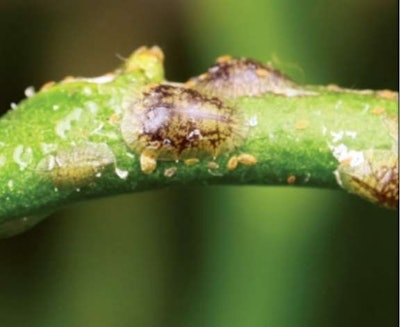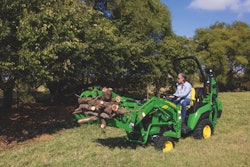
“Scale insects, far and away, can be some of the most difficult pests to control,” says Joe Chamberlin, regional field development manager for Valent Professional Products.
Your best bet is to rely on a strategy that emphasizes prevention but relies on fast-working systemic products when outbreaks occur.
Identifying scale
Scale insects are divided into two broad groups: soft scales and armored scales. Each has a different feeding habit, but their most distinguishing feature is that one group wears a flattened, plate-like cover. These are called armored scales. The other group, soft scales, is best known for excreting honeydew, a sweet, sticky liquid that can (annoyingly) drip on windshields and lawn furniture.
Identifying scale is not easy. Scout for honeydew to narrow the search and then take your findings online, using extension websites specific to your area.
Knowing which scale you’re dealing with is important because its lifecycle will impact ideal treatment schedules. It is easier to kill off the younger generation of scale, which usually emerges in the spring, but sometimes the summer.
Natural enemies
Scales have many natural enemies working to keep their populations in check. When the natural balance gets askew, introduction of other predators can be a good way to bring their number back down. “Many scales have effective parasitoids and predators,” says one expert. “Parasitoids are typically sold as adults (Aphytis) or sometimes pupae (other species).” These biological controls range in price from $20 to $80 depending on species and quantity ordered and can easily be ordered online and shipped to you (typically overnight).
Prevention
Another natural way to keep scales away is to also keep ants away. Controlling ants is important, especially those that are sugar feeders and ‘tend’ the honeydew-producing scales (e.g., Argentine ants in California).
You should also closely inspect plants before purchasing. Small numbers of scales can be easy to miss
Treatment options
In general, an application of a pyrethroid product will wipe out scales, but it will kill natural enemies as well. Some other foliar-applied products will, too. “Sometimes, you can make scales worse by using a foliar spray,” Chamberlin says.
For the most part, people are moving away from that toward soil applications. However, there are instances when foliar applications are the best route. “When the state of scale infestation is really out of control, maybe for a new client, and you need fast-acting control, you may need foliar control,” Chamberlin says.
Systemic insecticides are the preferred method for managing scale populations when levels get out of control. With this type of insecticide, the plant incorporates the active ingredient (AI), and the insects ingest it through typical feeding on the plant. While these types of insecticides can be applied foliarly, for the most part, they are used as a soil drench, trunk drench or injection.
Dinotefuran (Safari), does reach the harder-to-reach armored scales because it is more highly soluble in water, allowing it to travel more quickly through the plant’s xylem and farther into the plant’s storage tissue outside the vascular system. Thiamethoxam (Meridian) also ranks high in solubility, just behind dinotefuran.










